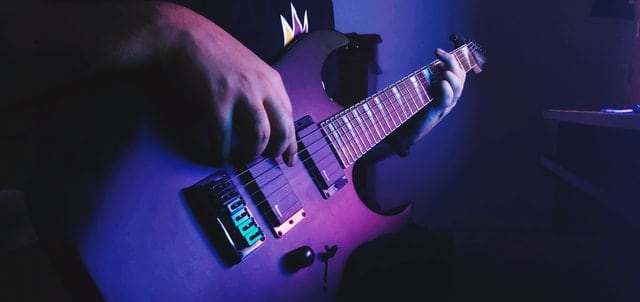In the current state of metal music, there’s an arms race on low tunings.
It seems that in most cases, the lower you go, the better.
And, don’t get me wrong, I have nothing against it. In fact, I find it fascinating.
But constantly pushing low-end boundaries makes us meet certain physical limitations from our instruments.
7 string guitars, or even instruments with more strings, are nowadays as popular as they ever have been.
However, the supremacy of 6 string guitars is hardly contested.
Chances are you own a 6 string, and along the way, you got interested in music played with an extra-low string. It happened to many of us.
So, is there a way of doing so?
Can you play 7 string songs on a 6 string guitar?
You can play 7 string guitar songs on a 6 string, however, you will have to make some adjustments such as changing your tuning and strings to match the lower ones of a 7 string or transposing the tune up so the lower pitches can be played on a 6 string with standard tuning.
In this article, I will dive deeper into this topic. I will try to lay out all the options I can come up with to help you achieve your metal goals.
After leaving this page you will have a clearer idea about what’s better for you, and determine if a 6 string is the right thing for you or if you should be aiming for something heavier.
Are you ready to get started?
Let’s go!
Can you play 7 string songs on 6 string guitars?
So, let’s kick things off by saying that you can absolutely play 7 string songs on a 6 string guitar.
The thing, however, is defining what we mean by “play”.
What I’m saying is, you can always transpose a song up an octave, for instance, and that would be a “correct” way of playing it, in terms of hitting the appropriate notes.
However, we all know that is not “correct” enough. In guitar, as in many other instruments, voicings and where you play things really matter.
You won’t get the same tone from playing the 5th fret on the 6th string in standard tuning, as playing the open 5th strings, although they both are an A note.
So, we will need to look at different ways of playing 7 string songs to define which will work better for you.
4 Ways of playing a 7 string song on a 6 string guitar
Pitch shifting, tuning like a 7 string, playing transposed to E, playing in a different positions
From the top of my head, I can come up with 4 ways of playing a 7 string song on a 6 string guitar:
1. Pitch shifting
A modern alternative, but something you should try is a pitch shifting effect.
These pedals or plugins take what you are playing, and transpose it down in real-time.
Latency and the ability to track many notes at the same time have always been the issues with these kinds of effects, but technological advances have made them viable in the last few years.
I would recommend these mostly for home recording.
2. Tuning like a 7 string
An age-old alternative, but as effective as you can get.
Just think of your 6-string guitar as a 7-string without the high E string. Get a 7-string set and just store the high E away.
This is as close as you would get to the real deal, however, you would be losing your higher string.
But hey, if you rarely use it you won’t ever miss it.
3. Playing transposed to E
As you might know, the relationship between strings is always the same, no matter how low you go.
So, if you just pick up what someone is playing on a 7 string and play it on a 6 string, you would be transposing it a fourth up.
What I mean with this is that if a riff uses a pedal note on the low 7th B string, and you just go and play it like it is on a 6 string using the 6th string’s E as the pedal, you would be playing the same song, but transposed 5 semitones up.
I will not work over the original recording, of course, but it will work in its own context.
4. Playing in the original key one octave up
Now, if you really need to play over the original recording, or with another player with a 7 string, you could simply try to figure out the riffs and lines one octave up on a 6 string.
Would it sound the same? Absolutely not.
It’s just a way around it when you can’t transpose or adjust your tuning.
Should you need to set up your guitar if you tune it like a 7-string?
It is likely that your 6-string guitar would need a setup after you go for a 7-string set and a lower B tuning.
However, as you tune lower and get thicker strings the tension exerted over your instrument’s neck might be the same as before.
This is not a rule of thumb, but you should give it a go and see how it feels. If you notice unwanted neck relief, dead notes, buzzing, or any of the other common issues, by all means, go get a professional setup.
What kind of strings would you need to tune as a 7-string guitar?
The easier way around tuning a 6 string as a 7 string would be just getting a 7 string set and throwing away the thinnest E string.
Ok, maybe keep it as a backup for any other guitar you have, or if you want to go back to a more standard string set.
Another alternative would be getting the thicker 6-string set you could find, and it will surely work.
On the other side of the spectrum, a regular 6-string set, say 09 or 10 gauge will likely not be thick enough to work properly with such a lower tuning.
However, by all means, you should give it a go. You won’t damage your guitar, it will only sound awful.
What’s the point of a 7 string guitar then?
The point of a 7-string guitar is just extending the range of the instrument. Although you might not find the keeping of the high E string useful, for many players it’s fundamental.
With a 7 string, you would still be able to play any tune intended for a 6 string, and just get a few extra low notes for when you need that extra low oomph.
Limitations of tuning a 6 string guitar like a 7 string
As discussed, the main limitation of tuning a 6-string guitar like a 7-string is losing the upper range of pitches that are usually intended for soloing.
It will depend mostly on the player preferences.
Also, shorter scale 6 string guitars might lack a bit in tension, requiring you to get thicker 7 string sets just to get it to feel like it should.
Is tuning a 6-string like a 7-string the same as a baritone guitar?
Tuning a 6-string guitar like a 7-string without the high E is kind of making it a baritone.
Baritone guitars are usually tuned a fourth lower than 6 strings, so the low E becomes a B. However, baritones also tend to come with longer neck scales.
A longer neck scale adds tension to the strings making them feel and play with the same feel and intonation as the ones you get on a standard 6 string.
Finally, another aspect of baritones is that many of them are not catered to the metal audience. They traditionally have more vintage specs and focus on a more surf rock sound.
This doesn’t mean that you won’t find a metal baritone around, but you might have to look for it for a while.
We have an article comparing 7 strings with baritones that I think might interest you:

Hello there, my name is Ramiro and I’ve been playing guitar for almost 20 years. I’m obsessed with everything gear-related and I thought it might be worth sharing it. From guitars, pedals, amps, and synths to studio gear and production tips, I hope you find what I post here useful, and I’ll try my best to keep it entertaining also.





